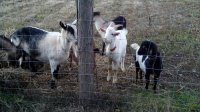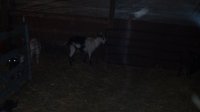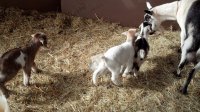Goat Whisperer
Herd Master
x2 on Babs post
It sounds like you are dealing with several things right now.
This is what I'd do if they were my goats…
Get a fecal run on all the goats, try to have a McMasters done- not just the normal slide like they use on dogs. The McMasters will give you an actual count.
Pull blood on all the goats and send it out for at least CAE & Johnes. Most think CAE as arthritis in older does but it can cause them to be skinny. I don't know what your lab changes, but our lab charges us $1.50 for each test per goat. If you are out of state it would be $3 for each test per goat. I would also be sending blood out on a select handful of goats and have a mineral analysis done. This cost more but would be worth it IMO.
After you get some data go from there. Stop tossing workers at them until you know what parasites you are fighting against. You may Aldo be dealing with mites or lice, but bald patches are usually due to copper deficiency.
I don't know how the vets are in your region but if you may want to hire in a GOOD goat vet to help your situation right now.
It sounds like you are dealing with several things right now.
This is what I'd do if they were my goats…
Get a fecal run on all the goats, try to have a McMasters done- not just the normal slide like they use on dogs. The McMasters will give you an actual count.
Pull blood on all the goats and send it out for at least CAE & Johnes. Most think CAE as arthritis in older does but it can cause them to be skinny. I don't know what your lab changes, but our lab charges us $1.50 for each test per goat. If you are out of state it would be $3 for each test per goat. I would also be sending blood out on a select handful of goats and have a mineral analysis done. This cost more but would be worth it IMO.
After you get some data go from there. Stop tossing workers at them until you know what parasites you are fighting against. You may Aldo be dealing with mites or lice, but bald patches are usually due to copper deficiency.
I don't know how the vets are in your region but if you may want to hire in a GOOD goat vet to help your situation right now.



